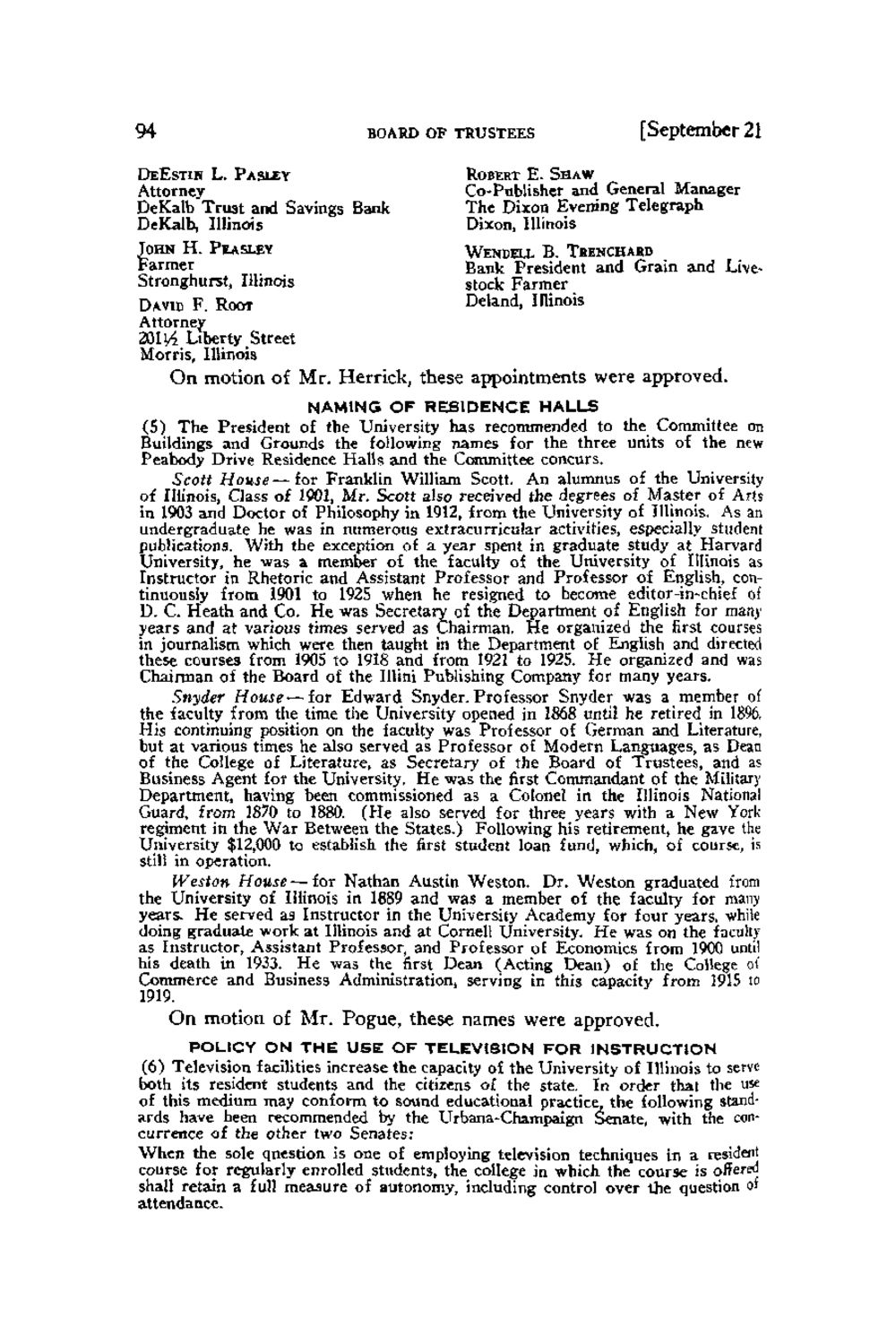| |
| |
Caption: Board of Trustees Minutes - 1962
This is a reduced-resolution page image for fast online browsing.

EXTRACTED TEXT FROM PAGE:
94 DEESTIH L. PASLEY BOARD OF TRUSTEES ROBERT E. SHAW [September 21 Attorney DeKalb Trust and Savings Bank DeKalb, Illinois JOHN H. PIASLEY Co-Publisher and General Manager The Dixon Evening Telegraph Dixon, Illinois WENDELL B. TBENCHABD Farmer Stronghurst, Illinois DMFID F. ROOT Attorney Bank President and Grain and Livestock Farmer Deland, Illinois 30IL4 Liberty Street Morris, Illinois O n motion of Mr. Herrick, these appointments were approved. NAMING OF RESIDENCE HALLS (5) The President of the University has recommended to the Committee on Buildings and Grounds the following names for the three units of the new Peabody Drive Residence Halls and the Committee concurs. Scott House— lav Franklin William Scott. An alumnus of the University of Illinois, Class of 1501, Mr. Scott also received the degrees of Master of Arts in 1903 and Doctor of Philosophy in 1912, from the University of Illinois. As an undergraduate he was in numerous extracurricular activities, especially student publications. With the exception of a year spent in graduate study at Harvard University, he was a member of the faculty of the University of Illinois as Instructor in Rhetoric and Assistant Professor and Professor of English, continuously from 1901 to 1925 when he resigned to hecome editor-in-chief of D. C. Heath and Co. He was Secretary of the Department of English for many years and at various times served as Chairman. He organized the first courses in journalism which were then taught in the Department of English and directed these courses from 1905 to 1918 and from 1921 to 1925. He organized and was Chairman of the Board of the Illini Publishing Company for many years. Snyder House'— for Edward Snyder. Professor Snyder was a member of the faculty from the time tiie University opened in 1868 until he retired in 1896, His continuing position on the faculty was Professor of German and Literature, but at various times he also served as Professor of Modern Languages, as Dean of the College of Literature, as Secretary of the Board of Trustees, and as Business Agent for the University. He was the first Commandant of the Military Department, having been commissioned as a Colonel in the Illinois National Guard, from 1870 to 1880. (He also served for three years with a New York regiment in the War Between the States.) Following his retirement, he gave the University $12,000 to establish the first student loan fund, which, of course, is stili in operation. Weston House — for Nathan Austin Weston. Dr. Weston graduated from the University of Illinois in 1889 and was a member of the faculty for many years. He served as Instructor in the University Academy for four years, while doing graduate work at Illinois and at Cornell University. He was on the faculty as Instructor, Assistant Professor, and Professor oE Economics from 1900 until his death in 1933. He was the first Dean (Acting Dean) of the College at Commerce and Business Administration, serving in this capacity from 1915 to 1919. On motion of Mr. Pogue, these names were approved. POLICY ON T H E USE OF TELEVISION FOR INSTRUCTION (6) Television facilities increase the capacity of the University of Illinois to serve both its resident students and the citizens of the state. In order that the use of this medium may conform to sound educational practice, the following standards have heen recommended by the Urbana-Champaign Senate, with the concurrence of the other two Senates: When the sole question is one of employing television techniques in a resident course for regularly enrolled students, the college in which the course is offered shall retain a full measure of autonomy, including control over the question of attendance.
| |